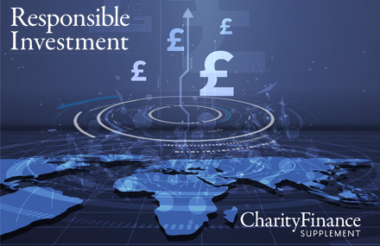It was not long ago that “ethical investing” (as it was usually then referred to) was seen as a fringe part of the investment management world. It usually only involved the screening out of so-called “sin stocks”, such as the tobacco, arms and adult entertainment industries. There was also a common view that this approach would limit investment returns.
Over the past few years, the focus on responsible investment has increased considerably. The offering has evolved to move beyond simply excluding stocks, to variously include seeking the best-in-class, shareholder engagement and investing in companies that are actively acting to create positive change.
The demand has come from all kinds of investors, but for the charity sector the drive towards this approach is obvious. Charities, of all kinds, are acting to bring improvements to the world. If they have an investment portfolio then it should not inadvertently be causing damage, especially to the specific areas that the charity works in. Whilst charities undoubtedly want to do the right thing, interest has also heightened as cases of charities with seemingly inappropriate investments have made the headlines. None want to find themselves on the front page as the next Comic Relief or Church of England. Investment managers have also increased their supply of responsible investment solutions and offerings. At the same time, a number of studies have shown the investment returns are not negatively affected.
So, the question must be asked as to why all investors have not adopted a responsible portfolio?
There are probably a number of reasons. Firstly, there may still be some lingering concerns about the long-term impact on returns. Understandably, some trustees will be cautious about investments losing value on their watch.
Another factor is confusion leading to inaction. As investment managers have increased their offerings, the same terms are often used in slightly different ways, or different terms are used in the same way. One person’s responsible investment is another’s sustainable investment and another’s ESG investment.
Also, there is the fear that these labels are being used by some to re-market existing products which are not truly modern responsible investment solutions – so-called “greenwashing”.
It is a difficult marketplace for the well-meaning investor without specialist knowledge to navigate, but a number of charities will feel that they cannot afford not to take their first steps into it.
The appetite seemingly will grow as time passes, and perhaps more clarity and transparency will emerge as responsible investment becomes more established in the mainstream.
One argument in the market is that responsible investment will naturally become the conventional way of managing investments in the not-too-distant future. The approach involves looking for companies that are well run and have business models that are sustainable in the future, as these are the ones that will provide good long-term returns.
Surely, this description has always been what a good investment manager should be doing for their clients? It is just that as society has changed and as the world responds to the climate crisis, some different filters are needed to judge the best buys of today and tomorrow.
Tristan Blythe Editor, Charity Finance












